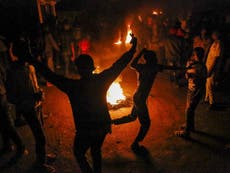Less than one in ten people are fully vaccinated against coronavirus in Kenya. A Kenyan government directive that residents must show proof of COVID-19 vaccination by 21 December to access services was welcomed by some businesses on Monday but criticized by others, who said low vaccination rates made it unrealistic.
Only 8.8% of people are fully vaccinated against COVID-19 in Kenya so far. Health Minister Mutahi Kagwe made the announcement on Sunday. Public services affected include schools, transport services, immigration and other state offices, and hotels, bars, restaurants, national parks and wildlife reserves.
The government will start a 10-day mass vaccination campaign on Friday, Kagwe said. Directives about vaccines have split public opinion globally. Some politicians and citizens say measures infringe on personal choice and others say they protect the public.
Carol Kariuki, chief executive of the Kenya Private Sector Alliance (KEPSA), which claims more than half a million members, told Reuters the group encouraged all Kenyans to get inoculated.
“This is not only good for business continuity and the economy but also to protect others,” she said.
But some local business owners said the directive were not practical.
“Who is going to implement it?” said Franklin Odhiambo, a restaurant owner in Nairobi. “Some of us may want to be compliant, others may not. So, it will create some unfair competition.”
The edict comes just a month after the government lifted a curfew in place since March 2020.
Rights group Amnesty International said Kenya would not be able to vaccinate the majority of its population by the deadline, so many people might be unable to earn a living, access transport or go to school.
Irungu Houghton, executive director of Amnesty International’s Kenya office, said the government directive was unrealistic and flawed.
“These regulations will deprive millions of people of their ability to earn a livelihood, to have access to security, health and transportation services back and forth from home to work or school,” he told Reuters.
“That’s not how we will win the war against COVID-19,” he said, calling on the government to work harder to address vaccine hesitancy.
“It turns what the WHO (World Health Organization) would argue is an important voluntary exercise into a coercive exercise.”
Shoe-shiner Winnie Buong agreed.
“They ought to have done a more aggressive vaccination campaign before lifting the lockdown,” Buong said. “I don’t understand why they want to make our lives more difficult.”
Though low compared to Western nations, Kenya’s rate of fully vaccinated citizens is higher than the African average of under 5%. The WHO says Africa lags in COVID-19 vaccination rates due to global inequities in vaccine supplies, not because Africans do not want to be vaccinated.
Kenya has reported about 255,000 coronavirus infections and 5,300 coronavirus-related deaths, according to a Reuters tracker. By Maggie Fick, Reuters





